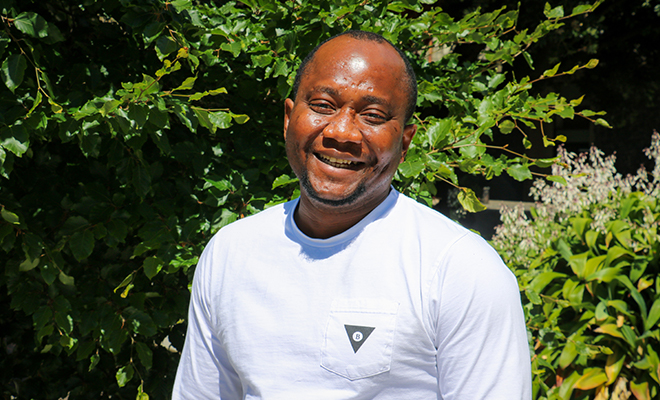Wednesday 16 December 2020 11:00am

Christian Chukwuka.
Christian Chukwuka has no regrets about his decision to study at Otago, after moving here all on his own from Nigeria to complete his PhD studies.
The 34-year old will graduate with a PhD in Ecology, having studied the field ecology of New Zealand gecko in the context of global climate change.
Born and raised in Nigeria, Christian describes himself as an aspirational child with a curious and inquisitive mind, often reading notes from his mother’s classroom teachings once she had written them up.
“I’ve had that inquisitive mind reading anything I came across. Everything. Newspapers. Magazines. No matter how old they are, I’d read it.”
This led him to ask questions about different things, including animals and their habitats and wanting to find out more about their lives, garnering interest in conservation and life sciences.
“It was a childhood dream to study overseas.”
His aspirations were encouraged by his parents who did not hold him back from studying his own interests, as well as support from his siblings.
Sadly, his father passed away in January of this year, on the cusp of the COVID-19 pandemic breaking out worldwide.
Christian dropped everything at the time to return to his home country and assist with the burial of his father.
He missed out on the funeral as he had to return to New Zealand as border restrictions ramped up.
As upsetting as it was that he could not be home for the funeral, he understands little else could be done given the circumstances of 2020.
Being in the middle of a global pandemic meant he was unable to travel or return home for longer, or else postpone his PhD to be there with his family.
The loss had a deep impact on Christian.
“It was a shock. I was struggling… Emotionally I was down for some time.”
During the entirety of January and February he avoided looking at his computer and working on his PhD.
“I did not look at my thesis for a month.”
However, despite this difficulty he overcame to the challenge and resumed writing his PhD upon his return to New Zealand and going into lockdown.
“During lockdown, I made an outline of my thesis and I disciplined myself to write and write and write. Eat, sleep, wakeup, exercise, eat, sleep, wakeup, exercise, eat, sleep, wakeup... By May 31st, I had my thesis complete,” he says.
And despite what the year has thrown at him, and the distance from his home, he has no regrets about travelling across the world for his study.
He especially wanted to thank his supervisors Professor Alison Cree and Dr Jo Monks.
“They are ready to talk any time... Alison was so awesome. She would do anything for you.”
They were always willing to answer and help with any queries he might have at any time of day, and he particularly appreciated the “open door policy” that was upheld during his studies.
“She ready to ask you about your welfare and your studies, any time,” he says.
He also commended the high-quality resources and facilities Otago had to offer.
A huge fan of animals, Christian was interested in New Zealand’s own endemic reptiles which stood out against the ones native to his home country.
While reptiles in Nigeria are typically known for laying eggs to reproduce, most New Zealand reptiles, and its geckos in particular, give live births to their offspring.
The geckos also live in a vastly different environment to West Africa.
Studying how the microhabitat use of New Zealand reptiles to help understand how they might adjust to future climate change, given that they live in a colder environment to other reptiles, was a huge drawcard.
He spent a significant amount of time analysing the gecko’s behaviours and how it uses different environments during the day in comparison to the night, and how this might be affected by warmer temperatures due to climate change.
It is estimated 40 per cent of the world’s reptile population could be extinct by 2080 if climate change is not managed.
However, as Christian found, this might not be the case for New Zealand reptiles due to the unique climate of the country, and that the gecko itself is in a better position to adjust to rising temperatures although this might only be in the short term.
He now wants to use climate change modelling to understand the long-term benefits it might have on the gecko, and how long it will last before it is affected by heat stress in the future.
Christian also said that his PhD had given them insight into setting up an alternative habitat elsewhere for the geckos in case if they are to be translocated, owing to the mining around Macraes Mine in Central Otago.
“We have a model for a particular size and thickness of rock slabs geckos select and what will maximise thermoregulation when setting up a new habitat”.
Christian has many fond memories from his time studying the gecko at Otago, and given the opportunity would study the same thing again if he could.
“Driving to the field at night in a four-wheel drive, down the valley with the sheep and cows in the field, with the field assistants there looking at the cloud, and watching the sun rise from the top of the hill in the morning... I have those memories. It was so fascinating.”
Whether he plans to continue research at Otago or move on elsewhere once he has graduated will depend on what scholarships are available and what he could potentially study.
At the moment, he is focused on graduation, with hopes to return home to see his family.
Overall he is exceptionally proud of his work and pleased with his decision to choose Otago.
“I am so happy… I am not regretting the decision to come to Otago.”
